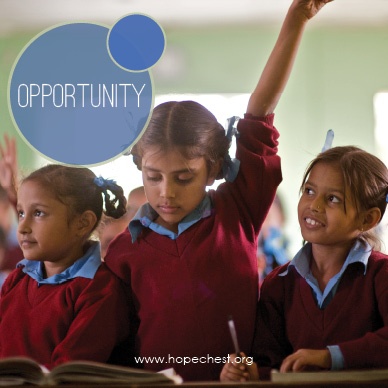 Right now, a group of HopeChest partners are raising $125,000 to expand the school at Kind Hearts in Ethiopia. They want to wrap this project up before the start of the next term. You can read about their efforts here, and find out how to support them here.
Right now, a group of HopeChest partners are raising $125,000 to expand the school at Kind Hearts in Ethiopia. They want to wrap this project up before the start of the next term. You can read about their efforts here, and find out how to support them here.
But let’s step back and ask, “Why bother with education at all?”
School, it seems, does not stir the heart quite as much as you’d think. At least if you look at the data, you’d wonder why there isn’t a rush to do everything possible to get the world’s girls into school for as long as possible.
Why girls?
There 130 million out of school youth in the world and 70 percent are girls.
This is important because the longer a girl is in school, the more money she is able to earn as an adult. And…“When women and girls earn income, they reinvest 90 percent of it into their families, as compared to only 30-40 percent for a man.”
Of course boys and girls both deserve, need, and benefit from education. But the data on girls is so compelling. In Swaziland, the longer a girl is in school, the longer she waits to have sex. Globally, girls with 7 years or more of education marries 4 years later, and has 2.2 fewer children.
[All statistics sourced from The Girl Effect Data]
 Here are some personal anecdotes that go along with this research:
Here are some personal anecdotes that go along with this research:
In Russia…orphans have very little opportunity to progress beyond secondary school. After targeted interventions by Children’s HopeChest, over a dozen students placed at university. This program was incredibly successful, and today several of those university graduates work for HopeChest as program staff and translators. All they needed was encouragement and opportunity.
In Swaziland…a woman named Gugu started a school underneath a tree for local girls. She asked them what it would take for them to stop having sex with local men. They asked for a school. Today, at the start of each school term, kids ask about their opportunity to go to school, get a uniform, and learn. They believe without education, there is little hope for the future.
In Ethiopia…our field staff work with communities who have prioritized education above food. Their number 1 priority is the education of their children. Which is why this project to expand the Kind Hearts School to 300 children, is so vitally important.
To read more about Kind Hearts, see this article from Karen Wistrom at “Family From Afar.”

